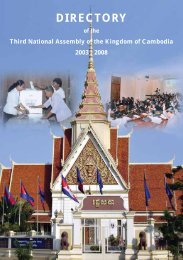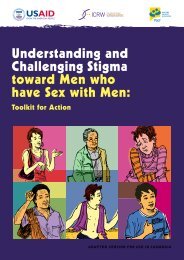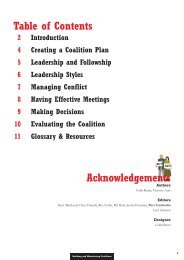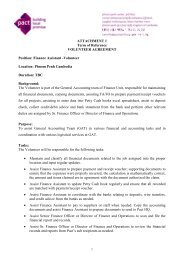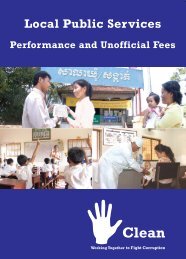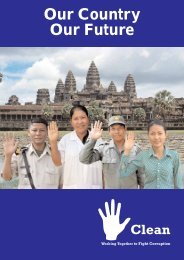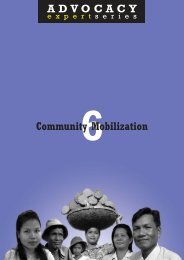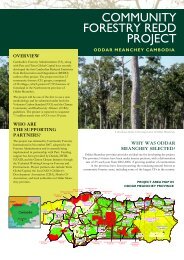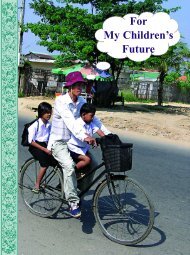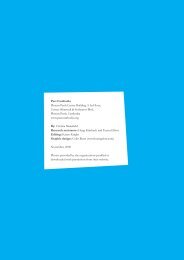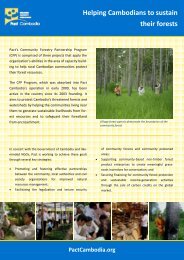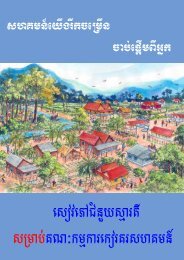Advocacy in Cambodia: Increasing Democratic ... - Pact Cambodia
Advocacy in Cambodia: Increasing Democratic ... - Pact Cambodia
Advocacy in Cambodia: Increasing Democratic ... - Pact Cambodia
Create successful ePaper yourself
Turn your PDF publications into a flip-book with our unique Google optimized e-Paper software.
HIV/AIDS<br />
NGO advocacy concerns <strong>in</strong>clude:<br />
Case Studies<br />
Dozens of NGOs <strong>in</strong> <strong>Cambodia</strong> are<br />
currently implement<strong>in</strong>g HIV/AIDS<br />
programs. This case study presents a brief<br />
look at network<strong>in</strong>g and policy oriented<br />
activities and is not <strong>in</strong>tended to be all<strong>in</strong>clusive.<br />
HIV/AIDS <strong>in</strong> <strong>Cambodia</strong><br />
The 2001 NGO Statement to the<br />
Consultative Group Meet<strong>in</strong>g section on<br />
HIV/AIDS <strong>in</strong>dicated that <strong>in</strong> 2000,<br />
approximately 169,000 people (2.8% of<br />
the population aged 25-49 years) were<br />
liv<strong>in</strong>g with HIV. In 2000 alone, there was<br />
an estimated 49,228 new <strong>in</strong>fections,<br />
transmitted ma<strong>in</strong>ly through heterosexual<br />
activity. NGO surveys <strong>in</strong>dicate that between 30%<br />
and 50% of people <strong>in</strong> villages has a relative who is<br />
HIV+ or whom has died of AIDS. Many HIV+<br />
people are unaware of their HIV status due to the<br />
paucity of test<strong>in</strong>g centers and the fear of<br />
discrim<strong>in</strong>ation that results from a positive<br />
diagnosis. In addition to the loss of human life,<br />
patient care creates a heavy burden on families<br />
that lose much-needed <strong>in</strong>come when people are<br />
unable to work, and which often go <strong>in</strong>to debt to<br />
cover medical expenses.<br />
NGOs are concerned about the validity of<br />
national HIV statistics, as the government is the<br />
only sent<strong>in</strong>el (test<strong>in</strong>g) organization. There are also<br />
doubts as to the reliability of the statistics,<br />
particularly regard<strong>in</strong>g condom use, and the degree<br />
to which statistics are placed <strong>in</strong> the public doma<strong>in</strong>.<br />
HIV/AIDS Coord<strong>in</strong>at<strong>in</strong>g Committee<br />
(HACC)<br />
Established <strong>in</strong> 1993, HACC is a network of<br />
55 organizations that have HIV/AIDS components<br />
to their programs. The network coord<strong>in</strong>ates with<br />
the National Aids Authority and the M<strong>in</strong>istry of<br />
Health to organize special event days. In 1999,<br />
HACC employed its first staff to take over<br />
coord<strong>in</strong>ation and communication between<br />
members, as the committee members were<br />
occupied with their own professional<br />
responsibilities. World Vision International (WVI)<br />
provided funds for an office and for adm<strong>in</strong>istrative<br />
• Patients’ access to treatment,<br />
<strong>in</strong>clud<strong>in</strong>g anti-retroviral<br />
treatment;<br />
• Patient care, as the government<br />
does not have a law or policy<br />
on the treatment of HIV/AIDS<br />
patients;<br />
• Blood test<strong>in</strong>g; and<br />
• Participation of all government<br />
m<strong>in</strong>istries <strong>in</strong> the HIV awareness<br />
rais<strong>in</strong>g effort.<br />
costs. One of HACC’s roles is respond<strong>in</strong>g to<br />
<strong>in</strong>quiries from other NGOs regard<strong>in</strong>g counsel<strong>in</strong>g,<br />
home care, and people liv<strong>in</strong>g with AIDS.<br />
HACC advocacy focuses ma<strong>in</strong>ly on awareness<br />
rais<strong>in</strong>g through the production of television spots<br />
and the celebration of public events such as<br />
Candlelight Day (day of remembrance for AIDS<br />
victims), World AIDS Day, and the Water Festival.<br />
The purpose of these events is to raise awareness<br />
about HIV/AIDS both with<strong>in</strong> the public and<br />
with<strong>in</strong> the government, <strong>in</strong> order to lobby the<br />
government to take more action <strong>in</strong> the fight<br />
aga<strong>in</strong>st AIDS. The Water Festival is an especially<br />
important event because people come from all<br />
over the country to spend four to five days <strong>in</strong> the<br />
capital. Occasionally HACC organizes public<br />
forums which are attended by government<br />
officials, NGOs, and members of the public.<br />
In 1997-98, HACC formed three work<strong>in</strong>g<br />
groups that cont<strong>in</strong>ue to meet to this day. The first<br />
is the counsel<strong>in</strong>g/homecare/support work<strong>in</strong>g<br />
group. A second work<strong>in</strong>g group addresses tra<strong>in</strong><strong>in</strong>g<br />
issues and the third one addresses IEC and media<br />
issues. The ma<strong>in</strong> purpose of each group is shar<strong>in</strong>g<br />
lessons learned. HACC ma<strong>in</strong>ta<strong>in</strong>s a series of<br />
leaflets, booklets, and documents on HIV that are<br />
available to the public, and publishes two<br />
directories, one with general <strong>in</strong>formation about<br />
members and a second conta<strong>in</strong><strong>in</strong>g <strong>in</strong>formation<br />
about HIV-related services around the country.<br />
HACC has also organized two tra<strong>in</strong><strong>in</strong>g<br />
88



